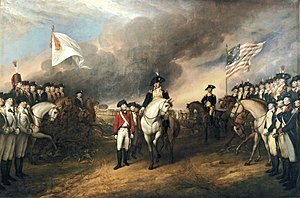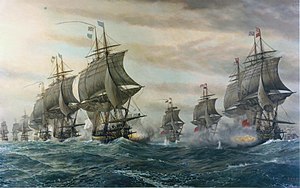
Back المشاركة الفرنسية في حرب الاستقلال الأمريكية Arabic France dans l'indépendance des États-Unis French アメリカ独立戦争におけるフランス Japanese Frankrike i den amerikanske uavhengighetskrigen NB Pháp trong Chiến tranh Cách mạng Mỹ Vietnamese


French involvement in the American Revolutionary War of 1775–1783 began in 1776[1] when the Kingdom of France secretly shipped supplies to the Continental Army of the Thirteen Colonies when it was established in June 1775. France was a long-term historical rival with the Kingdom of Great Britain, from which the Colonies were attempting to separate.
A Treaty of Alliance between the French and the Continental Army followed in 1778, which led to French money, matériel and troops being sent to the United States. An ignition of a global war with Britain started shortly thereafter. Subsequently, Spain and the Dutch Republic also began to send assistance, which, along with other political developments in Europe, left the British with no allies during the conflict (excluding the Hessians). Spain openly declared war in 1779, and war between British and Dutch followed soon after.
France's help was a major and decisive contribution towards the United States' eventual victory and independence in the war. However, as a cost of participation in the war, France accumulated over 1 billion livres in debt, which significantly strained the nation's finances. The French government's failure to control spending (in combination with other factors) led to unrest in the nation, which eventually culminated in a revolution a few years after the conflict between the US and Great Britain concluded. Relations between France and the United States thereafter deteriorated, leading to the Quasi-War in 1798.
- ^ Van Tyne, C. H. (October 1925). "French Aid Before the Alliance of 1778". The American Historical Review. 31 (1): 40. doi:10.2307/1904500. hdl:2027/mdp.39015027014961. JSTOR 1904500.